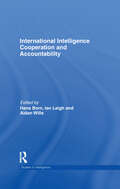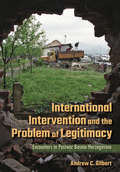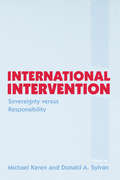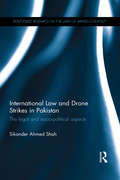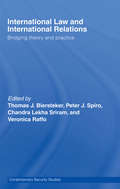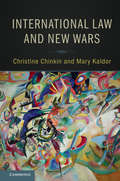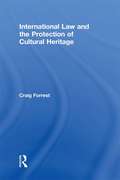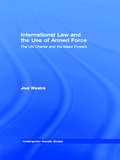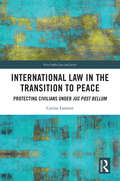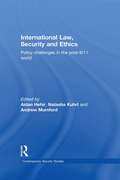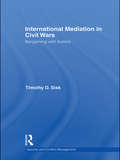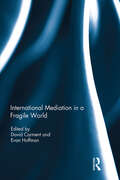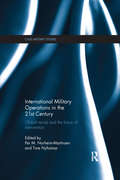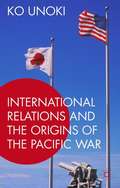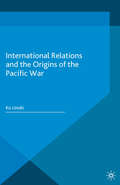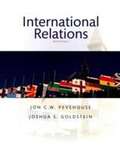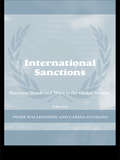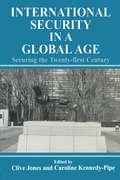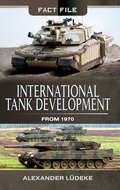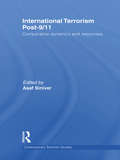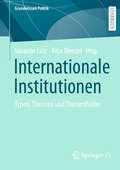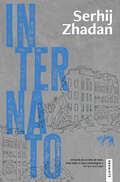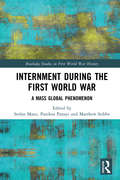- Table View
- List View
International Cultural Heritage Law in Armed Conflict
by Marina LostalThis book fills gaps in the exploration of the protection of cultural heritage in armed conflict based on the World Heritage Convention. Marina Lostal offers a new perspective, designating a specific protection regime to world cultural heritage sites, which is so far lacking despite the fact that such sites are increasingly targeted. Lostal spells out this area's discrete legal principles, providing accessible and succinct guidelines to a usually complex web of international conventions. Using the conflicts in Syria, Libya and Mali (among others) as case studies, she offers timely insight into the phenomenon of cultural heritage destruction. Lastly, by incorporating the World Heritage Convention into the discourse, this book fulfills UNESCO's long-standing project of exploring 'how to promote the systemic integration between the [World Heritage] Convention of 1972 and the other UNESCO regimes'. It is sure to engender debate and cause reflection over cultural heritage and protection regimes.
International Humanitarian Law
by Crawford, Emily and Pert, Alison Emily Crawford Alison PertThis clear and concise textbook provides an accessible and up-to-date examination of international humanitarian law. With the aid of detailed examples, extracts from relevant cases, and useful discussion questions, students are expertly guided through the text. A recommended reading list is included in every chapter to support deeper engagement with the material. Emerging trends in theory and practice are also explored, allowing readers to build on their knowledge and grapple with some of the biggest challenges facing the law of armed conflict in the twenty-first century.
International Intelligence Cooperation and Accountability (Studies in Intelligence)
by Hans BornThis book examines how international intelligence cooperation has come to prominence post-9/11 and introduces the main accountability, legal and human rights challenges that it poses. Since the end of the Cold War, the threats that intelligence services are tasked with confronting have become increasingly transnational in nature – organised crime, the proliferation of weapons of mass destruction and terrorism. The growth of these threats has impelled intelligence services to cooperate with contemporaries in other states to meet these challenges. While cooperation between certain Western states in some areas of intelligence operations (such as signals intelligence) is longstanding, since 9/11 there has been an exponential increase in both their scope and scale. This edited volume explores not only the challenges to accountability presented by international intelligence cooperation but also possible solutions for strengthening accountability for activities that are likely to remain fundamental to the work of intelligence services. The book will be of much interest to students of intelligence studies, security studies, international law, global governance and IR in general.
International Intervention and the Problem of Legitimacy: Encounters in Postwar Bosnia-Herzegovina
by Andrew GilbertIn International Intervention and the Problem of Legitimacy Andrew C. Gilbert argues for an ethnographic analysis of international intervention as a series of encounters, focusing on the relations of difference and inequality, and the question of legitimacy that permeate such encounters. He discusses the transformations that happen in everyday engagements between intervention agents and their target populations, and also identifies key instabilities that emerge out of such engagements. Gilbert highlights the struggles, entanglements and inter-dependencies between and among foreign agents, and the people of Bosnia-Herzegovina that channel and shape intervention and how it unfolds.Drawing upon nearly two years of fieldwork studying in postwar Bosnia and Herzegovina, Gilbert's probing analysis identifies previously overlooked sites, processes, and effects of international intervention, and suggests new comparative opportunities for the study of transnational action that seeks to save and secure human lives and improve the human condition.Above all, International Intervention and the Problem of Legitimacy foregrounds and analyzes the open-ended, innovative, and unpredictable nature of international intervention that is usually omitted from the ordered representations of the technocratic vision and the confident assertions of many critiques.
International Intervention: Sovereignty versus Responsibility
by Michael Keren Donald A. SylvanNational sovereignty, defined as a nation's right to exercise its own law and practise over its territory, is a cherished norm in the modern era, and yet it raises great legal, political and ethical dilemmas. This study looks at the problems created by international intervention.
International Law and Drone Strikes in Pakistan: The Legal and Socio-political Aspects (Routledge Research in the Law of Armed Conflict)
by Sikander Ahmed ShahWhile conventional warfare has an established body of legal precedence, the legality of drone strikes by the United States in Pakistan and elsewhere remains ambiguous. This book explores the legal and political issues surrounding the use of drones in Pakistan. Drawing from international treaty law, customary international law, and statistical data on the impact of the strikes, Sikander Ahmed Shah asks whether drone strikes by the United States in Pakistan are in compliance with international humanitarian law. The book questions how international law views the giving of consent between States for military action, and explores what this means for the interaction between sovereignty and consent. The book goes on to look at the socio-political realities of drone strikes in Pakistan, scrutinizing the impact of drone strikes on both Pakistani politics and US-Pakistan relationships. Topics include the Pakistan army-government relationship, the evolution of international institutions as a result of drone strikes, and the geopolitical dynamics affecting the region. As a detailed and critical examination of the legal and political challenges presented by drone strikes, this book will be essential to scholars and students of the law of armed conflict, security studies, political science and international relations.
International Law and International Relations: Bridging Theory and Practice (Contemporary Security Studies #90)
by Thomas J. Biersteker Chandra Lekha Sriram Peter J. Spiro Veronica RaffoThis unique volume examines the opportunities for, and initiates work in, interdisciplinary research between the fields of international law and international relations; disciplines that have engaged little with one another since the Second World War. Written by leading experts in the fields of international law and international relations, it argues that such interdisciplinary research is central to the creation of a knowledge base among IR scholars and lawyers for the effective analysis and governance of macro and micro phenomena. International law is at the heart of international relations, but due to challenges of codification and enforceability, its apparent impact has been predominantly limited to commercial and civil arrangements. International lawyers have been saying for years that 'law matters' in international affairs and now current events are proving them right. International Law and International Relations makes a powerful contribution to the theory and practice of global security by initiating a research agenda, building an empirical base and offering a multidisciplinary approach that provides concrete answers to real-world problems of governance. This book will be of great interest to all students of international law, international relations and governance.
International Law and New Wars
by Mary Kaldor Christine ChinkinInternational Law and New Wars examines how international law fails to address the contemporary experience of what are known as 'new wars' - instances of armed conflict and violence in places such as Syria, Ukraine, Libya, Mali, the Democratic Republic of Congo and South Sudan. International law, largely constructed in the nineteenth and twentieth centuries, rests to a great extent on the outmoded concept of war drawn from European experience - inter-state clashes involving battles between regular and identifiable armed forces. The book shows how different approaches are associated with different interpretations of international law, and, in some cases, this has dangerously weakened the legal restraints on war established after 1945. It puts forward a practical case for what it defines as second generation human security and the implications this carries for international law.
International Law and the Protection of Cultural Heritage (Routledge Studies in Cultural Heritage and International Law)
by Craig ForrestThe world’s cultural heritage is under threat from war, illicit trafficking, social and economic upheaval, unregulated excavation and neglect. Over a period of almost fifty years, the United Nations Educational, Scientific and Cultural Organisation has adopted five international conventions that attempt to protect this cultural heritage. This book comprehensively and critically considers these five UNESCO cultural heritage conventions. The book looks at the conventions in the context of recent events that have exposed the dangers faced by cultural heritage, including the destruction of cultural heritage sites in Iraq and the looting of the Baghdad museum, the destruction the Buddhas of Bamiyan in Afghanistan, the salvage of artefacts from the RMS Titanic and the illicit excavation and trade in Chinese, Peruvian and Italian archaeological objects. As the only existing work to consider all five of the cultural heritage conventions adopted by UNESCO, the book acts as an introduction to this growing area of international law. However, the book does not merely describe the conventional principles and rules, but, critically evaluates the extent to which these international law principles and rules provide an effective and coherent international law framework for the protection of cultural heritage. It is suitable not only for those schooled in the law, but also for those who work with cultural heritage in all its manifestations seeking a broad but critical consideration of this important area of international law.
International Law and the Use of Armed Force: The UN Charter and the Major Powers (Contemporary Security Studies)
by Joel WestraSince the UN Charter came into effect in 1945, there have been numerous incidents in which one or more of the five major powers (at least arguably) violated the Charter's Article 2(4) prohibition of force. Such incidents notwithstanding, this book demonstrates how the Charter restrains the major powers' military actions. As an instrument of international order, the Charter provides a framework of legal rules restricting the use of armed force. Although these rules are subject to auto-interpretation by the major powers (as a consequence of their veto), they create an expectation of compliance that subjects the major powers' military actions to international scrutiny. To reduce the likelihood of resistance from states threatened by such actions, major powers exercise prudential restraint, altering the manner and timing of their military actions in accordance with the legal arguments offered to justify those actions as consistent with the Charter and therefore not threatening to the existing international order. The book evaluates the efficacy of the Charter using large-N methods and five case studies: US intervention in the Caribbean, 1953–61; Anglo- French intervention in Egypt, 1956; Soviet intervention in Hungary, 1956; US–British intervention in Iraq, 1990–98; and US–British intervention in Iraq, 1999–2003. The book's extensive focus on the two Iraq cases provides a basis for timely evaluation of the continuing salience and possible reforms of the UN Charter system. This book will be of much interest to students of security studies, the UN, international law, and international relations.
International Law in the Transition to Peace: Protecting Civilians under jus post bellum (Post-Conflict Law and Justice)
by Carina LamontThis book proposes a normative framework specifically designed for the complex and legally uncertain time period between armed conflicts and peace. As such, it contributes both to the furthering of a jus post bellum framework, and to enhanced legal clarity in complex and legally uncertain environments. This, in turn, contributes to strengthened protection engagements, and thus to improved prospects of enabling sustainable peace and security in both national and international perspectives. The book offers a novel but persuasive argument for a legal framework specific for transitional environments. Such legal framework, it is argued, is warranted in order to enable legal clarity to contemporary and outstanding legal issues, as well as to furthering peace efforts in complex environments. The legal framework suggested proposes a dividing line between applicable legal frameworks that, it is submitted, enhances both legal clarity on protection engagements and the quest for sustainable peace. The framework proposed is founded on a legal analysis of the protective nature and function of law. It thus provides a rare but important perspective on law that is of value in the quest for sustainable peace and security. The research draws uniquely on both contemporary legal debates, and on peace and conflict research. It does so in order to enable legal analysis that is both legally sound, as well as appropriate and adequate in today’s peace and security realities. The book provides a valuable resource for academics, researchers and policy-makers in the areas of Public International Law, International Humanitarian Law, International Human Rights Law, (the law of) Peace Operations, and Peace and Security Studies.
International Law, Security and Ethics: Policy Challenges in the post-9/11 World (Contemporary Security Studies)
by Aidan Hehir Andrew Mumford Natasha KuhrtThis book examines the different ways in which the laws governing the use of force and the conduct of warfare have become subject to intense scrutiny and contestation since the initiation of the war on terror. Since the end of the Cold War, the nature of security challenges has changed radically and this change has been recognised by the UN, governments and academics around the world. The 911 attacks and the subsequent launch of the 'war on terror' added a new dimension to this debate on the nature and utility of international law due to the demands from some quarters for a change in the laws governing self-defence and humanitarian intervention. This book analyses the nature of these debates and focuses on key issues that have led to the unprecedented contemporary questioning of both the utility and composition of international law on the use of force as well as the practicability of using force, including handling of ‘prisoners’ and ‘security risks’. It also identifies the sources of division and addresses the capacities of security policy and international law to adapt to the changed international environment. This book will of much interest to students of international law, war and conflict studies, and IR and Security Studies in general.
International Mediation in Civil Wars: Bargaining with Bullets (Routledge Studies in Security and Conflict Management)
by Timothy D SiskThis book evaluates the role of international mediators in bringing civil wars to an end and makes the case for ‘powerful peacemaking’ – using incentives and sanctions – to leverage parties into peace. As internal violence within countries is a hugely significant threat to international peace in the post-Cold War era, the question of how these wars end has become an urgent research and policy question. This volume explores a critical aspect of peacemaking that has yet to be sufficiently evaluated: the turbulent period beyond the onset of formal or open negotiations to end civil wars and the clinching of an initially sustainable negotiated settlement. The book argues that the transnational flow of weapons, resources, and ideas means that when civil wars today end, they are more likely to do so at the negotiating table than on the battlefield. It uses bargaining theory to develop an analytical framework to evaluate peace processes – moving from stalemate in wars to negotiated settlement – and it rigorously analyses the experiences of five cases of negotiated transitions from war and the role of international mediators: South Africa, Liberia, Burundi, Kashmir, and Sri Lanka.
International Mediation in a Fragile World
by David Carment and Evan HoffmanContributions to this volume consider the importance of mediation in violent conflict. Practical and applied, this publication will be of interest to scholars, academics, policymakers and practitioners. It was originally published as a special issue of Canadian Foreign Policy Journal.
International Military Operations in the 21st Century: Global Trends and the Future of Intervention (Cass Military Studies)
by Per M. Norheim-Martinsen Tore NyhamarThis book examines the challenges that military forces will face in multinational operations in the 21st century. Expanding on Rupert Smith’s The Utility of Force, the volume assesses the changing parameters within which force as a political instrument is ultimately carried out. By analysing nine carefully selected mission types, the volume presents a comprehensive analysis of key trends and trajectories. Building upon this analysis, the contributors break the trends and parameters down into real and potential tasks and mission types in order to identify concrete implications for military forces in future multinational operations. The context of military intervention in conflicts and crises around the world is rapidly evolving. Western powers’ shrinking ability and desire to intervene makes it pertinent to analyse how the cost of operations can be reduced and, how they can be executed more intelligently in the future. New challenges to international military operations are arising and this book addresses these challenges by focusing on three key areas of change: 1) An increasingly urbanised world; 2) The changing nature of missions; 3) The commercial availability of new technologies. In answering these questions and embracing some of the insights of a growing field of future studies, the volume presents an innovative perspective on future international military operations. This book will be of much interest to students of international intervention, military and strategic studies, war and conflict studies, security studies and IR in general.
International Relations and the Origins of the Pacific War
by Ko UnokiInternational Relations and the Origins of the Pacific War takes the unique approach of examining the history of the relationship between Japan and the United States by using the framework of international relations theories to search for the origins of the Pacific War, that erupted with Japan's attack on Pearl Harbour in 1941.
International Relations and the Origins of the Pacific War
by Ko UnokiInternational Relations and the Origins of the Pacific War takes the unique approach of examining the history of the relationship between Japan and the United States by using the framework of international relations theories to search for the origins of the Pacific War, that erupted with Japan's attack on Pearl Harbour in 1941.
International Relations, Eleventh Edition
by Joshua S. Goldstein Jon C. W. PevehouseInternational Relations enables readers to form a framework for analyzing the complex and constantly changing information that comprises our increasingly interconnected world. Opening readers’ eyes to the positive and negative events that occur across the globe every day, authors Jon Pevehouse and Joshua Goldstein offer a strong foundation in current global affairs, with insight into topics like foreign assistance in the developing world, the changing nature of war, and global poverty levels. <P><P>The Eleventh Edition explores themes of international relationships from economic, social, and political standpoints. Through human scale stories that touch on broader themes such as war and peace, humans and their environment, poverty and development, and more, the book provides readers with relatable material to understand international relations.
International Sanctions: Between Wars and Words (Cass Series on Peacekeeping #Vol. 21)
by Peter Wallensteen Carina StaibanoThe main theme of the book is that the new types of sanctions constitute a challenge to the international system. First, there are more of the targeted sanctions, including financial, travel, aviation, special commodity and arms sanctions. Furthermore, there are considerable but varied practices in implementation. Also there are now sanctions by new actors (regional bodies, international organizations). These all put new strains on international bodies in carrying out sanctions or getting member states to work together in these efforts. These challenges are analyzed in this volume, with some examples, but mostly from a generalist perspective. A completely novel aspect is that this volume also includes studies of the difficulties that are met by targeting actors, their way of managing the situations, and most interesting, the human rights of such actors.
International Security Issues in a Global Age: Securing the Twenty-first Century
by Clive JonesThis volume examines the new, the changing, and the enduring features of international security in the post-Cold War era. In so doing, it examines the extent to which present state structures and institutions have been able to adapt and accommodate themselves to the diversity of security threats.
International Tank Development From 1970 (Fact File)
by Alexander LudekeA great upheaval in tank construction took place in the 1970s, as new combat techniques, helicopters, weaponry and new types of ammunition reduced the value of a conventional combat battalion. Nevertheless, complete new developments are rare and in this book, Alexander Ldeke looks at the most important developments that have taken place since 1970.
International Terrorism Post-9/11: Comparative Dynamics and Responses (Contemporary Terrorism Studies)
by Asaf SiniverThis edited volume brings together both western and non-western approaches to counter-terrorism in the post-9/11 era. This multi-cultural study of counter-terrorism strategies identifies common lessons from failed and successful attempts to counter the terrorist threat and provides guidelines for an effective counter-terrorism strategy. The book explores the changing dynamics of terrorism from a range of perspectives – from the global threat posed by home-grown terrorism in North Africa and the larger security dimensions in the Middle East, to the various strategies employed by western and non-western societies in their efforts to develop effective counter-terrorism strategies. Core themes in the book include the divergent dynamics of the phenomena categorised under the 'terrorism' label, and the domestic, national and regional variants of international terrorism. As such, the book offers in-depth analysis of the relationship between the local and the global, both in the root causes of, and responses to, terrorism since 9/11. This book will be of much interest to students of terrorism and political violence, security studies and IR. Asaf Siniver is Lecturer in International Security in the Department of Political Science and International Studies at the University of Birmingham.
Internationale Institutionen: Typen, Theorien und Themenfelder (Grundwissen Politik)
by Susanne Lütz Anja MenzelInstitutionen spielen eine zentrale Rolle bei der Kooperation und Konfliktregelung in der internationalen Politik. Sie beschränken oder ermöglichen bestimmte Verhaltensweisen und tragen dadurch zur Bearbeitung grenzüberschreitender Probleme bei. Dieses Lehrbuch führt in die theoriegeleitete Analyse der Entstehung und Funktionsweise verschiedener institutioneller Arrangements ein, in denen Staaten teils miteinander, teils mit privaten Akteuren grenzüberschreitend kooperieren. Behandelt werden Verhandlungen, Regime, Regimekomplexe und Formen transnationalen Regierens. Studierende der Politikwissenschaft erhalten einen analytischen und theoretischen Handwerkskasten für die Institutionenanalyse. Fallstudien aus den Politikfeldern Sicherheit, Wirtschaft, Handel, Finanzen, Umwelt und Wohlfahrt veranschaulichen die theoriegeleitete Analyse von Institutionen und vermitteln Studierenden Kompetenzen für die Durchführung eigener Studien.
Internato
by Serhij ZhadanPrémio Hannah Arendt 2022 Prémio EBRD 2022 Uma obra literária que captura o espírito do tempo, escrita por um autor de culto para uma inteira geração. Uma viagem de sobrevivência numa cidade do leste da Ucrânia transformada em palco de guerra.Um jovem professor procura trazer para casa o seu sobrinho de treze anos que se encontra num internato. Terá para isso de cruzar a cidade. Uma aventura perigosa de ida e volta, que durará um dia inteiro. A cidade está transformada num cenário de guerra e a escola um dos seus epicentros. Com uma arte narrativa, descrita pela crítica como «Jazz verbal», que transforma palavras em poderosas imagens, Zhadan descreve com rigor e inesperada poesia como a guerra transforma uma paisagem outrora familiar numa realidade apocalíptica, onde a destruição e o medo imperam. Os elogios da crítica: «Porventura mais do que qualquer outro escritor da era pós-soviética, Serhij Zhadan aborda a experiência da convulsão nacional e pessoal.» — The Times Literary Supplement «Internato é uma pequena obra-prima.» — Literatur Spiegel«O bardo da Ucrânia de leste, onde tudo se está a desintegrar.» — The New York Times «Zhadan tece as suas palavras — subtis, dolorosas, acutilantes — com um sentido delicado da melodia.» — Die Zeit «Neste romance, o talento literário de Serhij Zhadan brilha como uma estrela sobre a paisagem urbana pintada pelo silêncio e pelo rumor da guerra.» — Literary Hub«Um romance que permitirá ao leitor sentir o cheiro da guerra.» — SRF «Com o sentido lírico de um poeta, Zhadan revela sem pejo um país devastado e um povo determinado a sobreviver.» — Publishers Weekly
Internment during the First World War: A Mass Global Phenomenon (Routledge Studies in First World War History)
by Panikos Panayi Matthew Stibbe Stefan ManzAlthough civilian internment has become associated with the Second World War in popular memory, it has a longer history. The turning point in this history occurred during the First World War when, in the interests of ‘security’ in a situation of total war, the internment of ‘enemy aliens’ became part of state policy for the belligerent states, resulting in the incarceration, displacement and, in more extreme cases, the death by neglect or deliberate killing of hundreds of thousands of people throughout the world. This pioneering book on internment during the First World War brings together international experts to investigate the importance of the conflict for the history of civilian incarceration.

